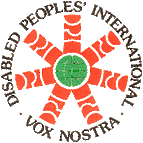Disabled Peoples' International - Europe
Online discussion on inequalities and persons with disabilities
Dear colleague,
Persons with disabilities were absent from the Millennium Declaration and have remained so throughout the Millennium Development Goals processes: according to the UN System Task Team report on the post-2015 agenda, the MDGs have not reached the poorest and most marginalized people. To ensure that inequalities are addressed in the post-2015 agenda, the Global Thematic Consultation onAddressing Inequalities(co-led by UNICEF and UN Women) is holding a series of online, moderated discussions to gather views from a broad range of stakeholders on what the post-2015 development agenda should look like.
In this context, we would like to invite you take part in an online discussion oninequalities and persons with disabilities, co-moderated by UNICEF and the International Disability Alliance (IDA).
The discussion starts today,14 Novemberand will run until5 December.
To participate, please visit the sitehttp://www.worldwewant2015.org/node/284531and post your response in the discussion forum.You are invited to register to the consultationhere. The site is available in English, French and Spanish. You are welcome to post your comments in any of the sixty languages supported by Google Translate. The site is designed to be compatible with screen readers, however, if you are unable to access the site, please email your response to:inequalities@worldwewant2015.org.
The discussion is co-moderated byVladimir Cuk,International Disability Alliance (IDA) andLieve Sabbe, Programme Specialist on Children with Disabilities at UNICEF.
To kick off the global conversation, we invite you to reflect on the following questions, among others:
What are themost alarming inequalitiesfacing persons - children, adolescents, adults, both women and men - with disabilities? When and where are these challenges occurring? What evidence exists to support your answer?
What are themajor factors that are contributing to these inequalities? (factors may include a whole range of possibilities, from attitudes and culture through to legal or physical barriers).
After one week of discussion, a second batch of questionswill follow on possible recommendations for policies, strategies, or interventions that would be useful in addressing the various inequalities experienced by persons with disabilities.
The recommendations emerging from your contributions will be incorporated into a report on ‘Addressing Inequalities in the Post-2015 Development Agenda’, to be presented at a high-level meeting in February 2013 in Copenhagen. The report will also be transmitted to the High-level Panel on Post-2015, appointed by the UN Secretary-General.
The consultation aims to be as broad and open as possible, in order to enable a multitude of voices to be heard from academia, media, non-governmental organizations (NGOs), civil society, private sector, governments and the UN System. We invite you to join us in envisioning a world where freedom from discrimination enables persons with disabilities, wherever they live, to contribute their full potential to the development of their societies.
We look forward to hearing from you on how to realize the Future We Want for All.
Warm regards,
Rosangela Berman Bieler, Chief, Disability Section, Programme Division, UNICEF
Vladimir Cuk,
International Disability Alliance (IDA)
Contact:inequalities@worldwewant2015.org
Discussion web site:http://www.worldwewant2015.org/node/284531
16 nov. 2012
